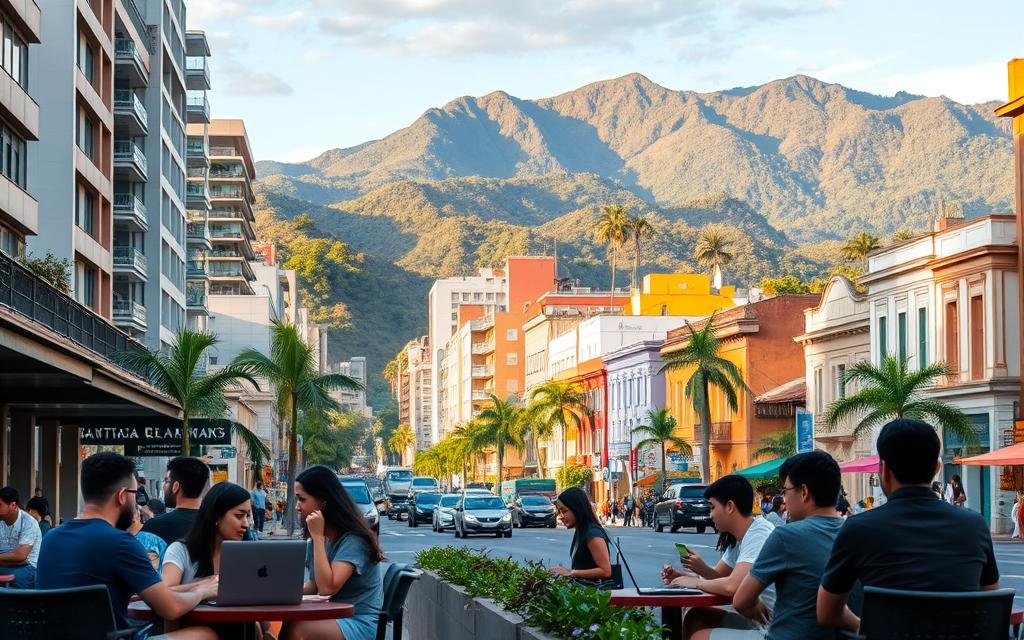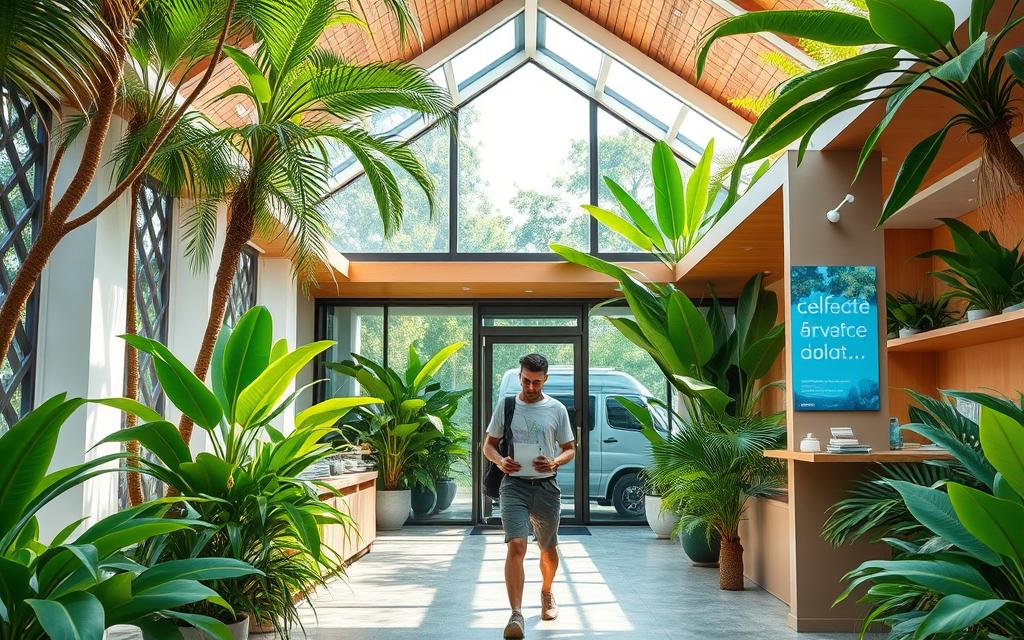How to live in Costa Rica as a digital nomad: Residency Options

We explore the various residency options available for digital nomads looking to make Costa Rica their home, whether temporarily or permanently.
Costa Rica has become a top destination for remote workers, offering breathtaking natural beauty and an expanding infrastructure to support remote work. The country's new digital nomad visa is a game-changer, providing benefits like tax exemptions and straightforward requirements for long-term stays.
As we delve into the world of residency options, we'll discuss the digital nomad visa, rentista residency, investment residency, and permanent residency paths, helping you navigate the best choices for your lifestyle.
Why Costa Rica Is a Digital Nomad Paradise

Costa Rica has emerged as a haven for digital nomads, offering a unique blend of natural beauty and modern amenities. With a warm climate and friendly locals, the country boasts strong internet connectivity even in its more remote, natural settings, making it ideal for remote work.
Natural Beauty and Climate
Costa Rica's stunning natural landscapes, from pristine beaches to lush rainforests and volcanic mountains, provide an inspiring backdrop for remote work. The country's year-round pleasant climate, with temperatures averaging between 70°F (21°C) and 81°F (27°C), makes it comfortable for digital nomads regardless of the season.
Political Stability and Safety
Costa Rica is renowned for its political stability, being one of the most stable countries in Latin America, with a strong democratic tradition and no standing army since 1949. This stability contributes to its safety and security, making it one of the safer countries in Central America for digital nomads.
The "Pura Vida" Lifestyle
The famous "Pura Vida" lifestyle embodies Costa Rica's approach to life, valuing simplicity, well-being, and connection with nature and community. This relaxed lifestyle, combined with the country's commitment to sustainability and vibrant local culture, enriches the experience of being a digital nomad in Costa Rica, making it a truly unique place to live.
Understanding Costa Rica's Digital Nomad Visa

Costa Rica's Digital Nomad Visa is designed to attract global talent, offering a unique blend of work and leisure. This visa is a significant step for remote workers, business owners, and freelancers who wish to stay longer than a tourist visa allows.
Benefits of the Digital Nomad Visa
The Digital Nomad Visa comes with several benefits, including tax exemptions on foreign income, the ability to open a local bank account, and the convenience of not having to leave the country for visa runs. These benefits make Costa Rica an attractive destination for digital nomads.
Eligibility Requirements
To qualify for the Digital Nomad Visa, applicants must meet specific eligibility requirements. These include proof of a stable monthly income of $3,000 for individuals or $4,000 for families, a valid passport, and proof of health insurance that covers the applicant and their family throughout their stay in Costa Rica.
Application Process
The application process for the Digital Nomad Visa involves gathering necessary documentation, submitting the application online, and paying a $100 fee. The visa is valid for a year and can be extended for an additional year, providing ample time for digital nomads to experience life in Costa Rica.
Rentista Residency Option

For those planning an extended stay in Costa Rica, the Rentista residency program is an attractive alternative to the Digital Nomad Visa. This residency option is designed for individuals who have a stable and sufficient income, allowing them to live in Costa Rica without the need to be actively employed in the country.
Who Qualifies for Rentista Residency
To qualify for Rentista residency, applicants must demonstrate a guaranteed monthly income from stable sources. This can include pensions, investments, or other forms of passive income. The key requirement is that the income is stable and sufficient to support the applicant's living expenses in Costa Rica.
Financial Requirements
The financial requirements for Rentista residency include showing a monthly income of at least $2,500 for a period of two years. Alternatively, applicants can deposit $60,000 in a Costa Rican bank. This financial stability ensures that the applicant can maintain a comfortable lifestyle in Costa Rica without needing to work.
Application Process and Timeline
The application process for Rentista residency involves submitting the required documentation, including proof of income, identification, and other legal documents. The typical timeline from submission to approval can vary, but it generally takes a few months. It's essential to ensure that all documentation is in order to avoid delays.
Investment Residency Option

Costa Rica's Investment Residency Option is designed for individuals willing to contribute significantly to the country's economy. This pathway to residency is particularly appealing to digital nomads who have entrepreneurial aspirations or wish to invest in real estate.
Categories and Minimum Investment
The Investment Residency Option requires a minimum investment of $150,000 in specific categories. These include real estate, businesses that create employment opportunities, certain stocks, and forestry projects. Each category has its unique benefits and requirements.
Business vs. Real Estate Investment
Investing in a business can be an attractive option for digital nomads with entrepreneurial experience, as it allows them to create jobs and contribute to the local economy. On the other hand, real estate investment provides a tangible asset and can be less demanding in terms of day-to-day management. The choice between the two often depends on the individual's business acumen and long-term goals.
Application and Documentation
The application process for Investment Residency involves submitting detailed documentation of the investment, including proof of the investment amount, business plans, or property deeds. It's crucial to ensure that all documents are in order and comply with Costa Rica's legal requirements to avoid delays.
Permanent Residency Path

For digital nomads looking to make Costa Rica their long-term home, understanding the path to permanent residency is crucial. Costa Rica offers a variety of residency options to suit different needs and circumstances, with permanent residency being a significant milestone for those who wish to stay indefinitely.
Qualifying for Permanent Residency
To qualify for permanent residency, digital nomads typically need to have held a temporary residency visa, such as Rentista or Investor, for at least three consecutive years. Demonstrating strong ties to Costa Rica, such as knowledge of its history and culture, and proving economic stability are also essential requirements.
Rights and Responsibilities
Permanent residents in Costa Rica enjoy several rights, including the ability to work legally, access to the public healthcare system, and a more straightforward path to eventual citizenship. However, they also have responsibilities, such as fulfilling tax obligations, complying with local laws, and visiting Costa Rica at least once per year to maintain their status.
Tourist Visa Extensions for Digital Nomads

The initial tourist visa can be a stepping stone for digital nomads aiming to establish a more permanent presence in Costa Rica. For many, the first step is understanding the duration and limitations of their initial tourist visa.
Australians, for instance, can stay in Costa Rica without a visa for 180 days, while other nationalities typically receive a 90-day tourist visa upon entry. Extending this stay requires a timely application for a visa extension.
Visa Run Options
One strategy digital nomads use to extend their stay is the "visa run." This involves leaving Costa Rica temporarily to reset the tourist visa period. Popular destinations for visa runs include Panama and Nicaragua, which are conveniently located and offer a quick reset. However, this method requires careful planning to avoid any legal issues.
Legal Considerations
Relying on tourist visa extensions or visa runs exists in a legal gray area, particularly for those working remotely. It's crucial for digital nomads to understand the legal implications of their stay and work arrangements. For detailed information on the digital nomad visa, visiting the official resources such as Jaros CR can provide valuable insights.
To navigate the tourist visa system responsibly, digital nomads should plan ahead, considering both the short-term needs and long-term residency goals. Understanding the legal framework and exploring more sustainable residency options are key steps in making Costa Rica a home.
How to Live in Costa Rica as a Digital Nomad

With its unique blend of tropical charm and digital infrastructure, Costa Rica beckons digital nomads to settle in and make the most of their remote work adventure. As we explore the practicalities of living and working in this beautiful country, we'll examine key considerations for setting up a productive remote work environment, managing time zones effectively, and building a professional network.
Setting Up Your Remote Work Environment
To work efficiently in Costa Rica, we need to establish a reliable remote work setup. This includes securing stable internet, investing in backup power solutions to mitigate the occasional blackouts, and creating an ergonomic workspace that fosters productivity. Many coworking spaces across the country offer these amenities, providing a conducive environment for digital nomads to thrive.
Managing Time Zones
Costa Rica's Central Time Zone aligns conveniently with North American work hours, making it an ideal location for those working with clients or teams in the United States or Canada. However, for those working with teams in different time zones, using a time zone converter can help schedule meetings effectively. This flexibility is a significant advantage for digital nomads, allowing them to work with clients globally while enjoying Costa Rica's "Pura Vida" lifestyle.
Building a Professional Network
Building a professional network is crucial for digital nomads in Costa Rica. We can connect with fellow remote workers and local professionals through various coworking spaces, networking events, and online communities. These connections not only provide support and collaboration opportunities but also help us stay updated on industry trends and best practices, ensuring we remain competitive in our respective fields.
Best Cities for Digital Nomads in Costa Rica

Costa Rica's diverse regions cater to different preferences, making it an ideal destination for digital nomads worldwide. The country offers a range of cities, each with its unique charm and advantages.
San José: The Urban Hub
San José, the capital city, is a vibrant urban center that offers a mix of culture, history, and modern amenities. It's an ideal location for digital nomads who prefer city living, with numerous coworking spaces and cultural attractions.
Tamarindo: Surf and Work
Tamarindo is a bustling beach town on the Pacific Coast, known for its surf culture and strong internet connectivity. It's a favorite among younger digital nomads, offering a blend of work and play.
Santa Teresa: The Bohemian Option
Santa Teresa is a scenic town on the Nicoya Peninsula, popular for its laid-back atmosphere and stunning beaches. It's perfect for digital nomads seeking a relaxed vibe and a growing community.
Puerto Viejo: Caribbean Vibes
Puerto Viejo de Talamanca on the Caribbean coast offers a unique cultural experience, with a blend of Latin, Afro-Caribbean, and indigenous influences. It's ideal for digital nomads looking for a slower pace of life and a vibrant community.
Nosara: Yoga and Wellness
Nosara is known for its yoga retreats and health-conscious community, making it a haven for digital nomads focused on wellness. The town offers a beautiful natural setting, though at a higher cost of living.
Each of these cities offers a unique experience for digital nomads, from urban hubs to beach towns and wellness retreats. Choosing the right location depends on individual preferences and priorities.
Internet and Connectivity Solutions

Staying connected is a top priority for digital nomads, and Costa Rica's internet landscape is designed to meet this need. With various internet service providers and mobile data options available, digital nomads can enjoy reliable connectivity across the country.
Internet Providers and Plans
Costa Rica offers a range of internet service providers, including Kolbi, Claro, and Movistar. Kolbi, backed by the state's ICE, offers the most extensive coverage, especially in rural areas. A local SIM card can be purchased for as little as $2, with data plans starting from around $10 for 2GB. When choosing an internet provider, consider factors such as coverage in your area of residence, data speeds, and pricing.
Backup Solutions for Remote Work
For digital nomads, having a backup internet solution is crucial. A Pocket WiFi Modem, or MiFi, is a portable device that provides a personal hotspot and can connect multiple devices. Most accommodations, including hotels, hostels, and Airbnbs, offer Wi-Fi as part of their service. Additionally, coworking spaces and cafes with reliable internet are great backup options.
Finding Accommodation as a Digital Nomad

The quest for the perfect place to stay is a significant part of the digital nomad experience in Costa Rica. With various accommodation options available, digital nomads can choose between short-term and long-term rentals, co-living spaces, and more, depending on their preferences and needs.
Short-term vs. Long-term Rentals
When it comes to rentals, digital nomads in Costa Rica have the flexibility to choose between short-term and long-term options. Short-term rentals offer the freedom to move around, while long-term rentals provide stability and often come with a discount. For instance, using platforms like Airbnb can be a great way to find short-term rentals, with prices varying based on location, property type, and season. You can often negotiate a better rate for longer stays, making it a cost-effective option for those planning to stay in one place for a while.
Co-living Spaces
Co-living spaces have become increasingly popular among digital nomads, offering a community-driven environment that combines living and working spaces. Places like Selina and Outsite provide not just accommodation but a ready-made community and work-friendly environments. These spaces are ideal for those looking to network and collaborate with like-minded individuals.
Negotiating Rental Agreements
Whether you're opting for a short-term or long-term rental, understanding how to negotiate a rental agreement is crucial. This includes knowing the typical terms, deposits, utilities, and important clauses to look out for in Costa Rican rental contracts. Local real estate agencies can be invaluable in this process, providing insights into different neighborhoods and local rental laws. You can also find rental properties through online portals like Encuentra24 and OLX, or through Facebook Groups dedicated to expatriates and rentals in Costa Rica.
By exploring these options and understanding the local rental market, digital nomads can find the perfect accommodation to suit their lifestyle in Costa Rica.
Cost of Living for Digital Nomads
As a digital nomad, understanding the cost of living in Costa Rica is crucial for planning your stay. Costa Rica offers a unique blend of affordability and quality of life, making it an attractive destination for remote workers.
Living in Costa Rica as a digital nomad can be relatively affordable compared to other popular western nomad hubs. The cost of living varies significantly depending on the location, lifestyle, and personal preferences.
Monthly Budget Breakdown
A detailed breakdown of monthly expenses is essential for digital nomads to manage their finances effectively. Here's a rough estimate of the key monthly expenses:
Rent: $800-$1300 per month for a single-bedroom apartment in the city center, and $700-$1100 in suburban areas.
Utilities: $50-$100 per month for basic services like electricity, water, and garbage.
Internet: $50-$70 per month for high-speed internet.
Groceries: $250-$400 per month, depending on dietary preferences and shopping habits.
Transportation: $30-$50 per month for public transportation.
Saving Money Tips
To make the most of living in Costa Rica, digital nomads can adopt several money-saving strategies. Shopping at local farmers' markets, using public transportation, cooking at home, and taking advantage of "happy hour" specials are some effective ways to reduce expenses.
By being mindful of their spending habits and exploring affordable options, digital nomads can enjoy a comfortable lifestyle in Costa Rica without breaking the bank.
Healthcare and Insurance Requirements

As digital nomads consider Costa Rica as their temporary home, understanding the healthcare and insurance requirements becomes crucial. Costa Rica is renowned for its high-quality healthcare system, which is a significant draw for expatriates and digital nomads alike.
Public vs. Private Healthcare
Costa Rica's public healthcare system, known as Caja Costarricense de Seguro Social (CCSS), is highly regarded for its quality of care. However, as a digital nomad, you may also consider private healthcare options. Private healthcare in Costa Rica offers shorter waiting times and more personalized care, but at a higher cost. For more information on health insurance options for digital nomads in Costa Rica, you can visit this resource.
Insurance Options for Digital Nomads
For digital nomads, having the right health insurance is mandatory. Costa Rica requires proof of health insurance that covers you and your family members throughout your stay. International health insurance that includes medical evacuation is highly recommended. You can choose from global health insurance plans, local private insurance providers like INS, or travel insurance with extended coverage. It's essential to select a plan that suits your needs and provides comprehensive coverage.
Banking and Financial Considerations
As digital nomads, navigating Costa Rica's financial landscape is crucial for a seamless experience. Costa Rica offers a relatively straightforward banking system, with various options for managing finances.
Opening a Bank Account
Opening a bank account in Costa Rica can be a straightforward process if you have the right documentation. Typically, you'll need a valid passport, proof of income, and sometimes a reference from your current bank. Some banks are more foreigner-friendly than others, with Banco Nacional and Scotiabank being popular choices. Alternatively, digital banking solutions like Wise offer a convenient way to manage your finances without the need for a traditional bank account.
Tax Implications for Digital Nomads
Costa Rica's territorial tax system generally doesn't tax foreign-earned income, making it an attractive destination for digital nomads. Holders of the Digital Nomad Visa may also benefit from specific tax incentives. However, it's essential to understand the tax implications of your income and potentially consult with a tax professional to ensure compliance with local regulations.
Managing finances remotely requires careful consideration of currency exchange rates and fees. Using US dollars is widely accepted in Costa Rica, but getting a better rate in Costa Rican colones (CRC) can be more cost-effective. Digital nomads can benefit from using services like Wise for more favorable exchange rates and lower fees.
Transportation Options Around Costa Rica
Navigating Costa Rica as a digital nomad requires understanding the various transportation options available. Costa Rica's transportation infrastructure caters to different needs, from public buses to ride-sharing services, making it relatively easy to get around.
Public Transportation
Public transportation in Costa Rica is affordable and extensive, with buses being the primary mode of transport. The bus network covers most areas, including popular digital nomad spots. However, it can be slow due to frequent stops and potential delays.
Renting or Buying a Vehicle
Renting or buying a vehicle offers more flexibility, especially for those planning to explore remote areas. Car rentals can be expensive, and it's crucial to research reputable companies like ANSAR to avoid potential scams. Driving in Costa Rica can be challenging, especially during the rainy season, so it's essential to be prepared.
Ride-sharing and Taxis
Ride-sharing services like Uber are available in larger cities, providing a convenient and relatively safe option. Taxis are also widely available, but it's recommended to use licensed services and agree on the fare before starting your journey.
When planning your stay in Costa Rica, consider the location's accessibility and the transportation options available. This will help you make the most of your time and enjoy the various areas the country has to offer.
Building Community as a Digital Nomad
Creating a community as a digital nomad in Costa Rica involves more than just networking; it's about building lasting relationships. As a hub for digital nomads, Costa Rica offers various opportunities to connect with like-minded individuals.
Digital Nomad Meetups and Events
Costa Rica is home to a thriving community of digital nomads, with numerous meetups and events across the country. Joining Facebook groups for expats and digital nomads is a great way to start. These groups often organize meetups, workshops, and other events that provide opportunities to network and build connections.
Integrating with Local Culture
While connecting with fellow digital nomads is important, integrating with the local culture can enrich your experience. Learning Spanish, participating in community events, and developing relationships with Costa Ricans can help you build a more diverse and meaningful community. By balancing time between the expat/digital nomad community and local culture, you can enhance your overall experience of living in Costa Rica.
Conclusion
For those considering a digital nomad lifestyle, Costa Rica offers a compelling mix of modern amenities, stunning beaches, and a relaxed atmosphere. Throughout this article, we've explored the various residency options available, including the Digital Nomad Visa, Rentista, Investment, and Permanent Residency paths, each with its unique advantages.
Costa Rica's natural beauty, "Pura Vida" lifestyle, and growing infrastructure for remote workers make it an ideal destination. We've discussed practical aspects such as finding accommodation, setting up reliable internet, and managing finances. For those ready to take the next step, JAROSCR provides professional assistance with residency applications. Contact them at info@jaroscr.com or +(506)7182-8969 to start your Costa Rican digital nomad journey.


